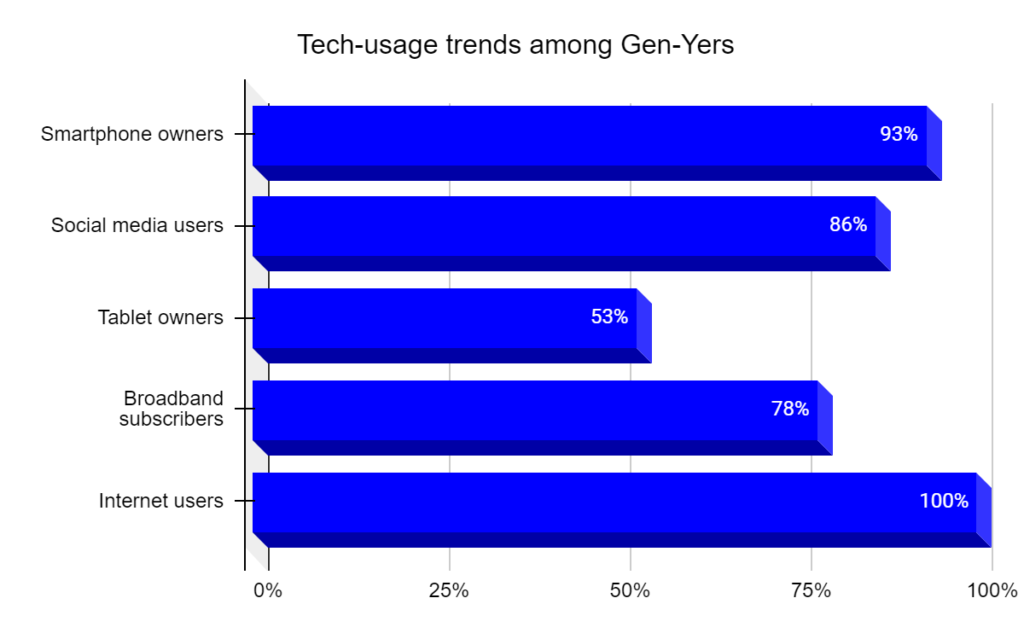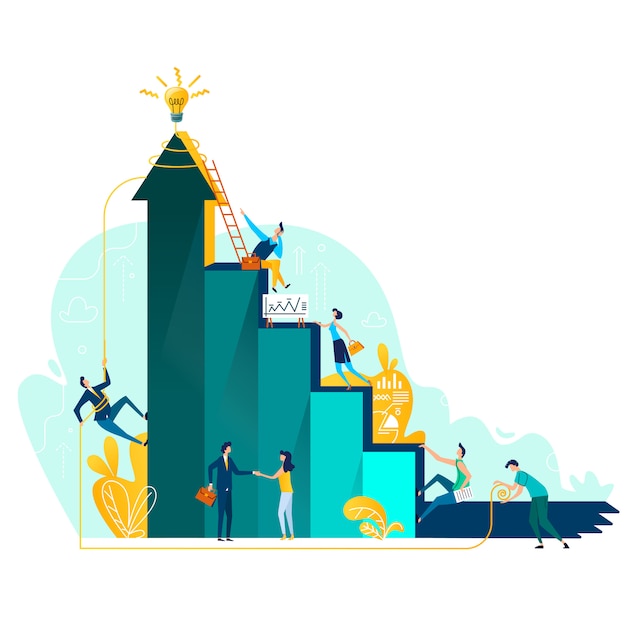Pew Research Center suggests that “Millennials are the largest generation in the U.S. labor force.” Now, along with the Post-Millennials, which comprises 40% of your growing workforce. Therefore, organizations need to rethink their training strategies. Why? A majority of baby boomers (people born after World War II) and Gen-X-ers (individuals born between 1965 – 1980) are retiring from their jobs. Thus, with this shift in age demos, corporate knowledge dissemination needs to change. Let’s explain why.

The learning habits of millennials differ from their predecessors. Also called Gen-Y (those born between 1981 – 2001), millennials identify themselves as the Net Generation. Why? They have matured while accessing instant information—multi-media, cell phones, texts — you name it. Even in learning, they prefer web-based tools and online courses.
Therefore, to design a customized corporate training program that best suits the Gen-Y needs, you must understand this tech-savvy generation’s mindset. It is vital to study their preferences, learning methodologies, and behavioral patterns. In short, you should have a fair idea of their learning habits. And this is where we come in. Read on!
Table of Contents
Millennials Learning Habits
Gen-Y-ers Love Their Technology

Millennials have never been away from technology. The digitally savvy Net Generation prefers practical, inclusive learning methods rather than traditional classroom lectures.

Moreover, research conducted by Allego states that millennials favor spending 12% less time in conventional training sessions. Additionally, the American Psychological Association suggests that Gen-Y-ers do not prefer strict, one-way training sessions. They want to relate their learning to real-life scenarios.
As you can see, organizations need to consider the aforementioned behavioral patterns to engage millennials through their training programs via an LMS application. Therefore, with the help of technology, you can expect better results – as the millennial brain connects to it better.
Screen Over Lectures

Business Insider reported in a Harris poll conducted by the nonprofit Growing Leaders, “69% of people 18 to 34 said they think they learn more from technology than from people. That was the largest percentage among the 2,264 respondents – just 50% of baby boomers over 45 felt the same – and likely an indication that the younger Gen Z crowd feels similarly.”
Technology drives Gen-Y. And as per the same study, they prioritize online learning modes over offline set-ups. So, how can you make use of this trait? One of the almost-perfect ways to implement this is by ditching paper-based materials and replacing them with online modules (eLearning). Again, the application of video clips is another method as they help learners to connect to practical scenarios.
Ease of Access (My pace and my place!)

It is a no-brainer that millennials love their smartphones. Whenever they need information, they head to Google or social media. Knowingly or unknowingly, they continuously share their knowledge, thoughts, and opinions via these tools. Yes, they are prone to using platforms that are instantly accessible and offer immediate feedback.
Therefore, organizations must adopt employee training methodologies that take full advantage of this trait in millennials. One of the best processes is to go for mobile-based learning modules. It ensures that millennials are at ease of accessing company resources whenever they want — on the go!
Bite-sized Learning

Bite-sized learning, aka micro-learning, is a tried and tested method that engages millennials. By segmenting training sessions into manageable, smaller chunks, organizations can disseminate information in easily absorbable slices. Short learning modules enable the busy Gen-Y-er to access, learn and retain information within small time frames. Additionally, microlearning reduces cognitive load and diminishes the burden of learning via long, boring sessions.
Gamification of Corporate Training

Do you know that gamified learning modules lead to high impact corporate training? Forbes reports that in a Zogby poll, “A majority of 18-34-year-olds (57%) told us that they play video games at least three times a week. We wondered how important they feel that playing video games is to develop several works- and life-skills. Two in three (67%) said it was important to learn how to create winning strategies. Seven in ten (70%) felt it aided them in learning how to solve problems. Almost two in three (63%) noted the importance of video in teaching them how to work smoothly and successfully on a team.”
As you can see, millennials use gaming to improve their skillsets, solve problems, and build strategies. Furthermore, if you infuse your learning programs with game-based elements, you can reap the maximum benefits from the aforementioned Gen-Y trait. Gamified training translates to increased motivation, engagement, and enjoyment. Of course, couple it with instant feedback plus reward systems, and you can augment the competitive streak of your millennial workforce!
Guidance and Communication

Millennials are eager to learn. Supportive mentors who give them regular feedback can encourage them to work toward consistent improvement. Proper communication channels and the option of asynchronous input from managers and peers can boost your corporate learning program’s effectiveness. Again, when employees inhabit different time zones and geographical locations, feedback-embedded learning solutions become vital to induce a learning environment.
Personal Development Precedes Salary

Millennials are ambitious. They want to learn, enhance their existing knowledge base, and perform better. In several cases, Gen-Y-ers prioritize personal development over take-home salary. With proper research, you can take full advantage of this desire. Use the power of learning to keep them engaged in the longer term. After all, engaged employees are loyal employees. Loyal employees mean larger workforce retention rates for your organization!
Conclusion
Millennials are the future of the corporate world! It is essential that as an organization, we learn to design learning strategies that meet this digitally native generation’s expectations. And we hope that our blog has helped you take the first steps in this direction — by understanding the most common millennials learning patterns!







Dear Friends! Many thanks for your work and for your service!
It is always interesting for me to find something new and interesting for myself right here.
Today I chose to register and thank you for the work.
Best regards, yours forever!